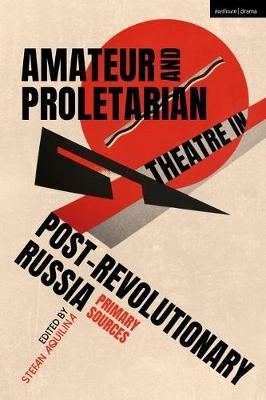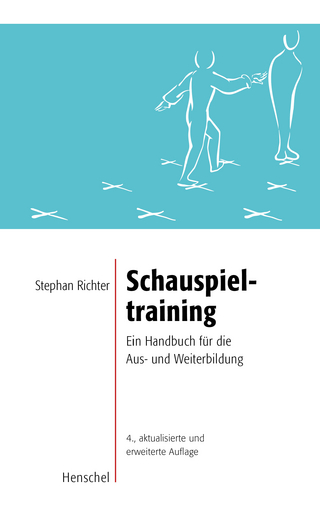
Amateur and Proletarian Theatre in Post-Revolutionary Russia
Methuen Drama (Verlag)
978-1-350-22883-2 (ISBN)
The essays tell a story of unabashed optimism in the creativity of the working classes. They speak of the use of theatre to carve a public and political role in the construction of a new world. The sources, however, also exhibit the flipside of the scene, or the sombre difficulties faced by the amateur actors and the incessant calls to raise standards through professional help. The narrative developed is that of an amateur theatre which began as an autonomous and heterogeneous activity but which by the mid-to-late 1920s was transformed into a regulated practice and a space for cultural programming.
The collection makes an important contribution to our understanding of modern theatre: scholarship conventionally tackles the canonical names from the professional world but gives little attention to the more down-to-earth forms of performance taking place in factories, clubs and amateur circles. An introductory essay also highlights the range and significance of the collection and draws links between the essays.
Stefan Aquilina is Director of the School of Performing Arts and Senior Lecturer in Theatre Studies at the University of Malta. He has published widely on modern theatre in Russia, including Stanislavsky in the World (co-edited with Jonathan Pitches, Methuen Drama, 2017) and Modern Theatre in Russia (Methuen Drama, 2020).
Acknowledgements
Translation Credits and a Note on Transliteration
List of Figures
Introduction
Prologue, 1918
Platon Kerzhentsev
An extract from Revoliutsiia i teatr, pp. 5-12
Part 1 Aims and Objectives
1. ‘The Proletariat and Art’, 1918
Anatoly Lunacharsky
Proletarskaia kul'tura, no. 2, pp. 23-24
2. ‘The Proletariat and Art’, 1918
Resolutions proposed at the First All-Russian Conference of
Proletarian Cultural and Educational Organizations
Alexander Bogdanov
Proletarskaia kul'tura, no. 5, page unidentified
3. ‘The Proletkult and Soviet Cultural Work’, 1919
Anatoly Lunacharsky
Proletarskaia kul'tura, no. 7-8, pp. 1-3
4. ‘Ways Towards a Proletarian Culture’, 1920
Alexander Bogdanov
Proletarskaia kul'tura, no. 15-16
5. ‘The Proletkult – Organisation of Proletarian Amateur Performance’, 1918
Platon Kerzhentsev
Proletarskaia kul'tura, no. 1, pp. 7–8
6. ‘Craving the Stage’, 1919
Nikolai Lvov
Vestnik teatra, 56, p. 8
7. ‘Socialist Theatre in the Years of the Revolution’, 1919
Piotr Kogan
Vestnik teatra, 40, pp. 3-4
8. ‘No to Theatre Art, but to Celebration’, 1921
Adrian Piotrovsky
Zhizn' iskusstva, 19-22 March, 1921, page unidentified
9. ‘Drama and Mass Performances’, 1921
Viktor Shklovsky
Zhizn' iskusstva, 9-11 March, 1921, page unidentified
Part 2 Amateur-Professional Relations
10. ‘On the Professionalization of the Workers in the Arts’, 1919
Fyodor Kalinin
Proletarskaia kul'tura, no. 7-8, pp. 29-31
11. ‘On Professionalism’, 1919
Valerian Pletnev
Proletarskaia kul'tura, no. 7-8, pp. 31-37
12. The Creation of the Proletarian Theatre, 1923
Platon Kerzhentsev
An extract from Tvorcheskii teatr, pp. 75-88
Part 3 Repertoire Issues
13. Repertoire at a Factory Theatre, [1918]
Alexander Mgebrov
An extract from Zhizn' v teatre tom 2, pp. 302-06
14. ‘The Repertoire of the Proletarian Theatre’, 1918
Platon Kerzhentsev
Iskusstvo, no. 1 (5), pp. 5–7
15. Notes on Pavel Bessalko’s The Bricklayer, [1918]
Alexander Mgebrov
An extract from Zhizn' v teatre tom 2, pp. 420-33
16. ‘Adapt the Plays!’, 1919
Platon Kerzhentsev
Vestnik teatra, no. 36, pp. 6–8
17. Garland’s Inheritance, 1923
Valerian Pletnev
An extract from the play, Act 1, pp. 5-17
18. They Tried to Hide, but Ended Up Fathers, 1924
Arkhip
Rabochii klub, no. 5, pp. 34-37
Part 4 Production Approaches and Examples
19. ‘After the Holiday’, 1918
Platon Kerzhentsev
Iskusstvo, no. 6, pp. 3-5
20. Performances During the Civil War, [1919]
Alexander Mgebrov
An extract from Zhizn' v teatre tom 2, pp. 365-71
21. Collective Readings, [1918-19]
Alexander Mgebrov
An extract from Zhizn' v teatre tom 2
22. ‘Collective Creation in the Theatre’, 1919
Platon Kerzhentsev
Proletarskaia kul'tura, no. 7-8, pp. 37-41.
23. ‘Strife Between the Arts’, 1919
Platon Kerzhentsev
Vestnik teatra, no. 19, p. 2.
24. ‘On Futurism’, 1919
Fyodor Kalinin
Proletarskaia kul'tura,no. 7-8, pp. 41-3
25. ‘Creative Play. The Improvisation Method of N. Skarskaia’, 1919
Pavel Gaideburov
VO, no. 6-8, pp. 36-40
26. ‘Experiment in the Staging of Émile Verhaeren’s Poem Insurrection’, 1919
Valentin Smyshlaev
Gorn, no. 2-3, pp. 82-90
27. The Results of the New Theatre, 1923
Platon Kerzhentsev
An extract from Tvorcheskii teatr, pp. 123-36
28. The Proletarian Actor, 1922
Valentin Tikhonovich
An extract from the essay ‘Proletarian Theatre’, originally published in O Teatre,
a book edited by V. Blum, E. Beskin, B. Ferdinand, A. Gan, I. Aksenov, V. Tikhonovich, M. Zagorsky, B. Arvatov, O. Blum, V. Rappaport, L. Sabaneyev, O Teatre, pp. 89-96
29. ‘The Dramatisation of a Living Newspaper’, 1924
Moscow Proletkult
An essay from the volume Iskusstvo v rabochem klube, pp. 66-71
30. ‘On Staging Agit-Trials’, 1924
Moscow Proletkult
An essay from the volume Iskusstvo v rabochem klube, pp. 96-99
31. ‘Club Stage – Competition of Living Newspapers’, 1927
N.N.V
Rabochii i teatr, no. 15, pp. 16-17
Part 5 Training
32. ‘On the Work of the Theatre Department of the Moscow Proletkult’, 1918
Valentin Smyshlaev
Gorn, no. 1, p. 54
33. Dramatic Laboratories, 1923
Platon Kerzhentsev
An extract from Tvorcheskii teatr, pp. 88-94
34. ‘A Unified Studio of the Arts’, 1924
Moscow Proletkult
An essay from the volume Iskusstvo v rabochem klube, pp. 9-16
35. ‘On Theatre Work at the Clubs’, 1924
Moscow Proletkult
An essay from the volume Iskusstvo v rabochem klube, pp. 17-24
Epilogue
Sections from N. Evreinov’s intervention during the conference on theatre
organised by the Agitprop Division of the Communist Party, 1927
| Erscheinungsdatum | 14.12.2022 |
|---|---|
| Übersetzer | Dr Stefan Aquilina |
| Zusatzinfo | 10 bw illus |
| Verlagsort | London |
| Sprache | englisch |
| Maße | 156 x 234 mm |
| Themenwelt | Kunst / Musik / Theater ► Theater / Ballett |
| ISBN-10 | 1-350-22883-4 / 1350228834 |
| ISBN-13 | 978-1-350-22883-2 / 9781350228832 |
| Zustand | Neuware |
| Informationen gemäß Produktsicherheitsverordnung (GPSR) | |
| Haben Sie eine Frage zum Produkt? |
aus dem Bereich


